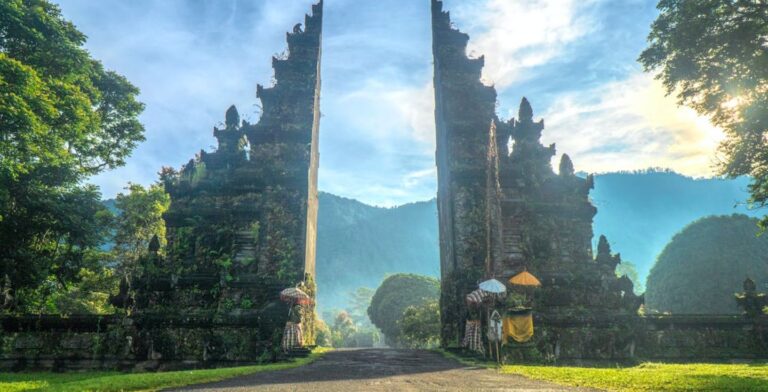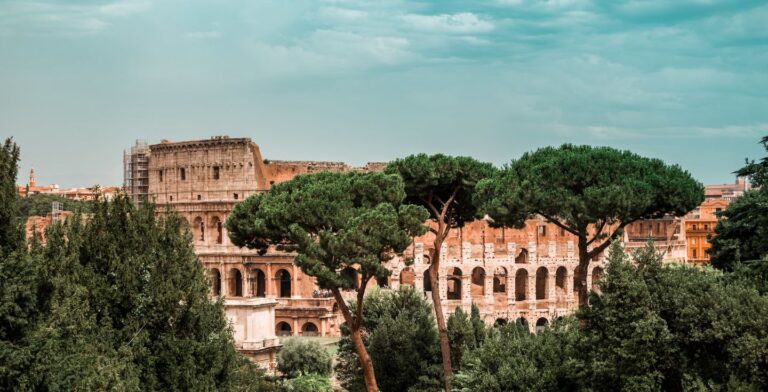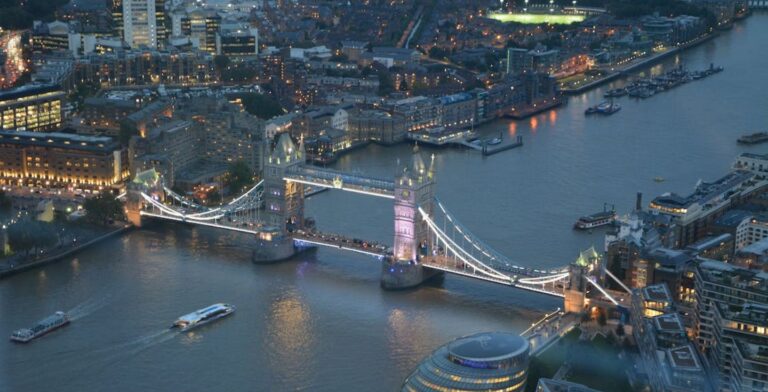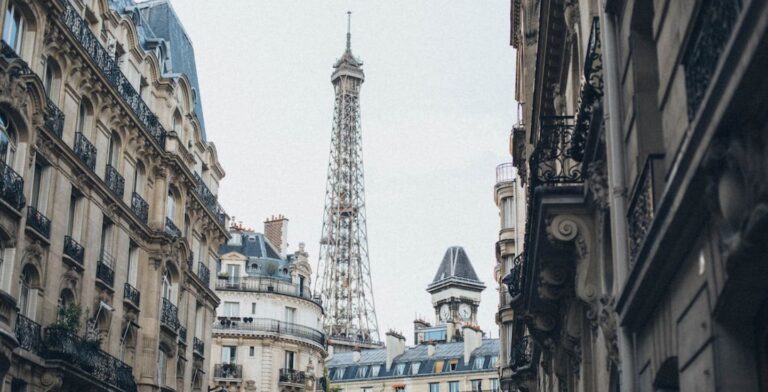Morocco Travel Guide
Read about everything you need to know about going to Morocco in our travel guide. Learn about the things to do, stay connected and more!


 +1M
+1M
Holafly saves you +30% compared to other roaming fees
Plans that may interest you
Ready for another adventure? Be prepared for your journey to Morocco with our travel guide! Whether you’re planning your first trip to this North African gem or looking for inspiration for your next escapade, this guide is here to provide you with essential information to make your Moroccan journey unforgettable.
Morocco offers a unique blend of vibrant culture, stunning landscapes, and historical richness. From bustling markets in Marrakech to the serene sands of the Sahara Desert, Morocco has something to offer every traveler. Here, we’ll cover everything from where Morocco is located to the best times to visit, top tourist hotspots, and much more. Don’t miss out on anything there’s for you here and you’ll definitely have a great trip.
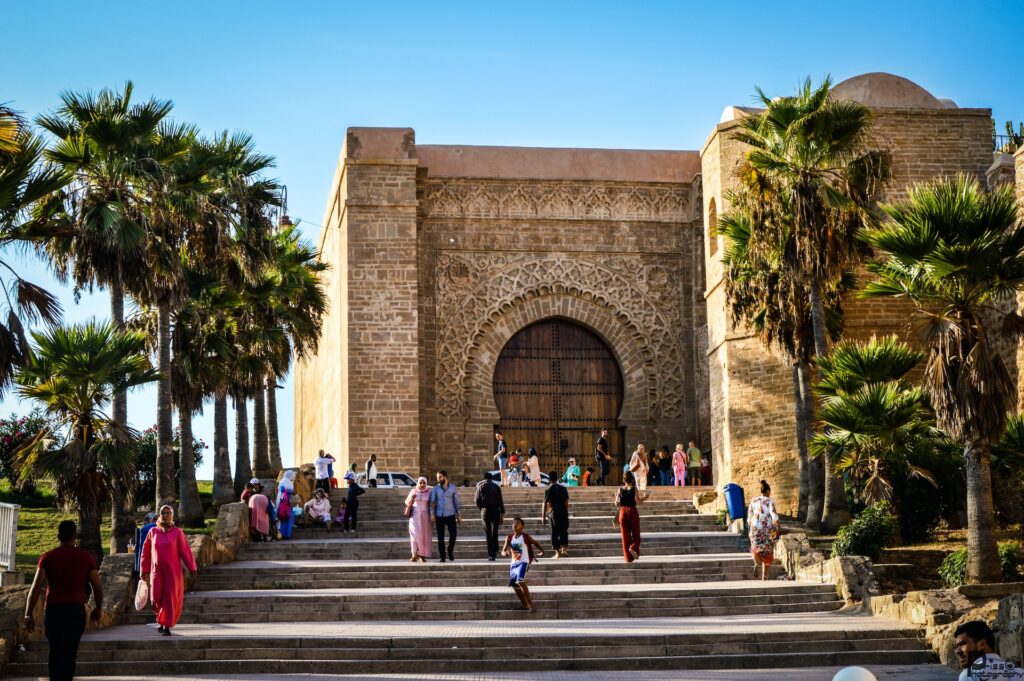
Where is Morocco?
Morocco is located in North Africa and shares its borders with the Atlantic Ocean and the Mediterranean Sea to the west and north, Algeria to the east, and the Western Sahara to the south. The country offers a diverse geography, with the Atlas Mountains running through the middle, dividing the landscape into coastal plains, fertile valleys, and the vast Sahara Desert to the south. Take a closer look at the map below to locate the main cities.
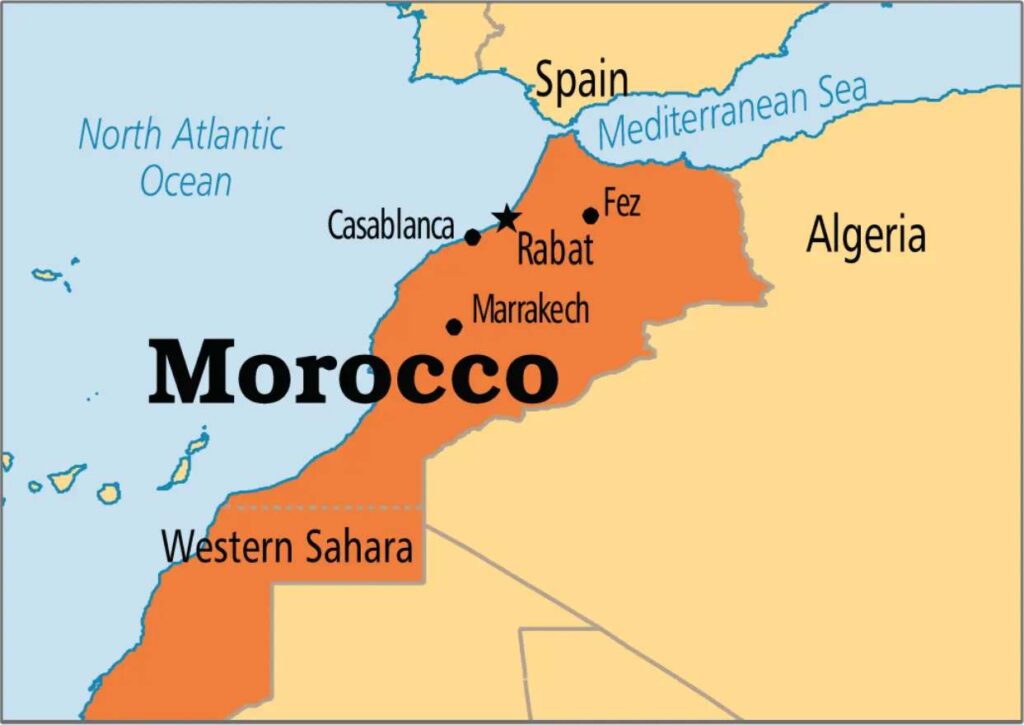
As you can see, Spain is a common destination to visit when we are in Morocco due to its proximity. Don’t stop staying connected and count on Holafly, which offers one of the best eSIM for Spain travel.
Time Zone:
Morocco goes by Greenwich Mean Time (GMT+1) during most of the year, and during Ramadan, they set the clock one hour earlier.
Weather:
Morocco’s climate varies from the Mediterranean in the north to desert in the south. The best time to visit depends on your preferences and the region you plan to explore. Coastal areas are pleasant year-round, while the Sahara Desert can be extremely hot during the summer. However, if you are still eager to discover the serene sands, the best time to go is from September to June.
Best Time to Visit Morocco
The ideal time to visit Morocco depends mainly on where you want to go and what you’d like to see. With that in mind, you can plan out your travel route in Morocco with some details included in this guide. Here’s a general overview of what you can do all year:
Spring (March to May):
Spring is a fantastic time to explore Morocco’s cities, as the weather is mild and wildflowers carpet the landscape. You can experience Ramadan from March 22 to April 1. You can go to the Sahara desert for the Marathon of the Sands from April 21 to May 1 or to the International Nomad Festival from April 30 to May 1 in M’hamid el Ghizlane.
Summer (June to August):
While coastal areas remain pleasant, inland regions, including the Sahara Desert, can be scorching during the summer months. There are plenty of festivals you can enjoy, like the Festival of World Sacred Music, the Mawazine Festival—Rhythms of the World, the Gnaoua and World Music Festival, the Popular Arts Festival, the Cherry Festival and so much more.
Autumn (September to November):
This is another excellent time for a visit, with comfortable temperatures and fewer crowds. You can go on day tours to the desert or even private tours to discover towns and cities. Just like in other seasons, there are plenty of festivals to choose from.
Winter (December to February):
Winters are mild along the coast but cold in the interior and Atlas Mountains. It’s a great time for skiing in the mountains thanks to fewer crowds. You can take advantage of the time of year and spend new years creating life-lasting memories.
Where to Go in Morocco
Morocco offers an array of exciting destinations to explore, and this travel guide has the perfect destinations you can explore. Here are some top tourist spots with information on costs, transportation, and tips:
Marrakech
The city of Marrakech is the capital of Morocco and is renowned for its historic medina, magnificent palaces, and exciting souks. The Koutoubia Mosque, the Bahia Palace, and the world-famous Jardin Majorelle are just a few of the city’s many cultural and touristic highlights. Marrakech’s center square, Jemaa el-Fna, comes alive with performers and food stands and is a major draw for tourists.
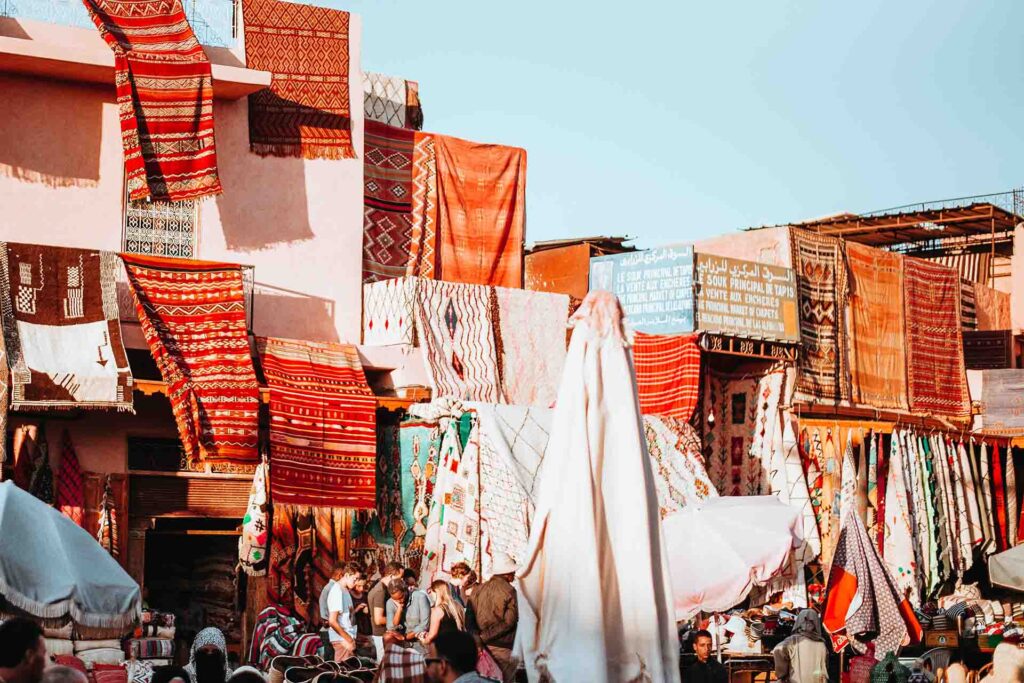
Details
Cost: The cost of visiting Marrakech can vary depending on your preferences and travel style. On average, a mid-range budget traveler can expect to spend around $50–100 per day, which includes accommodation, meals, and local transportation. Luxury travelers can spend significantly more, while budget-conscious travelers can find options to lower their costs.
How to Get There: Marrakech is well-connected to various international destinations through its Menara Airport. You can book a direct flight to Marrakech or connect through major European cities like Paris, Madrid, or Lisbon. Once in Marrakech, you can take a taxi or shuttle to the city center.
Tips:
- Explore: Marrakech’s historic Medina is a UNESCO World Heritage Site filled with narrow winding streets, bustling souks, and stunning architecture. Take your time to wander and get lost in its labyrinthine alleyways.
- Jardin Majorelle: This beautiful garden, once owned by Yves Saint Laurent, is a peaceful oasis in the heart of the city. Don’t miss the vibrant blue buildings and exotic plants.
- Local Cuisine: Moroccan cuisine is a delight. Savor tagines, couscous, and street food like delicious kebabs and pastries in the Djemaa el-Fna square.
- Bargain in Souks: When shopping in the souks, bargaining is expected. Be prepared to haggle for the best deals on spices, textiles, and souvenirs.
- Respect Local Customs: When you travel to Morocco, you’ll notice it’s a predominantly Muslim country, so dress modestly and be mindful of local customs and traditions. It’s customary to ask for permission before taking photos of people.
Fes
The Moroccan city of Fes (sometimes written Fez) is a fascinating blend of history and culture. Fes is one of the oldest imperial cities in Morocco, and it is considered the cultural capital of the country. There is also a medina, which is a UNESCO World Heritage Site and will take you back in time. The city is a major center of Moroccan handicrafts, and its ceramics, leatherwork, and textiles are world-renowned.
Cost: The cost of visiting Fes can vary based on your travel style. On average, a mid-range budget traveler can expect to spend around $40–80 per day, covering their basic travel needs. Of course, if you want to get the high-end package, it’ll be more expensive. Popular sites to reserve accommodation are Booking, Expedia and Airbnb.
How to Get There: Fes has its own airport, Fes-Saïss Airport, with connections to several European cities. You can book a direct flight to Fes or connect through Casablanca’s Mohammed V International Airport. From the airport, you can take a taxi to the city center.
Tips:
- Discover: Fes is renowned for its well-preserved, medieval old town, which is also a UNESCO World Heritage Site. Wander through its narrow streets, visit traditional workshops, and admire the stunning architecture.
- University of Al Quaraouiyine: Founded in 859 AD, it’s considered the world’s oldest continually operating degree-granting university.
- Shop for Handicrafts: Fes is known for its quality leather goods, carpets, and pottery. Haggle with shopkeepers in the medina to get the best deals.
Sahara Desert
The world’s largest scorching desert, the Sahara, 11 countries in North Africa and 9.2 million km². This enormous dry region has thousands of sand dunes, rocky plateaus, and high temperatures. It is about the size of the US and is a place of harsh extremes, with daytime temperatures reaching blistering highs and very cold nights. Additionally, it is home to a range of uniquely adapted creatures, including the fennec fox, dromedary camel, addax, desert monitor lizard, and more. These animals have evolved to survive in the desert’s extreme conditions, where water and food are scarce.
Cost: The cost of a Sahara Desert adventure can vary widely depending on the type of experience you’re looking for, and this destination definitely has to be included in this travel guide. Tours can range from budget to luxury. A budget traveler can find basic desert tours for around $50–100, while a more luxurious, private experience can exceed $500 per day.
How to Get There: The Sahara Desert can be reached from various starting points in Morocco, such as Merzouga, Zagora, or M’Hamid. Most visitors join organized tours departing from cities like Marrakech or Fes. These tours typically include transportation to the desert and all necessary arrangements.
Tips:
- Choose Your Desert Entry Point: Research different desert towns to find the experience that suits you best, as each offers unique landscapes and activities.
- Camel Trekking: A camel trek is a must for experiencing the desert. Be prepared for a bumpy ride and incredible starry nights.
- Camping: You can choose between traditional Berber desert camps or luxury glamping options, depending on your preferences.
- Bring Essentials: Ensure you have plenty of water, sunscreen, and warm clothing for chilly desert nights.
- Stargazing: The Sahara offers some of the world’s best stargazing. Don’t forget to look up at the incredible night sky.
With so many things to do in Morocco, you’ll never get bored. If you need a more comprehensive guide on what exactly you can do at this destination, check out this post!
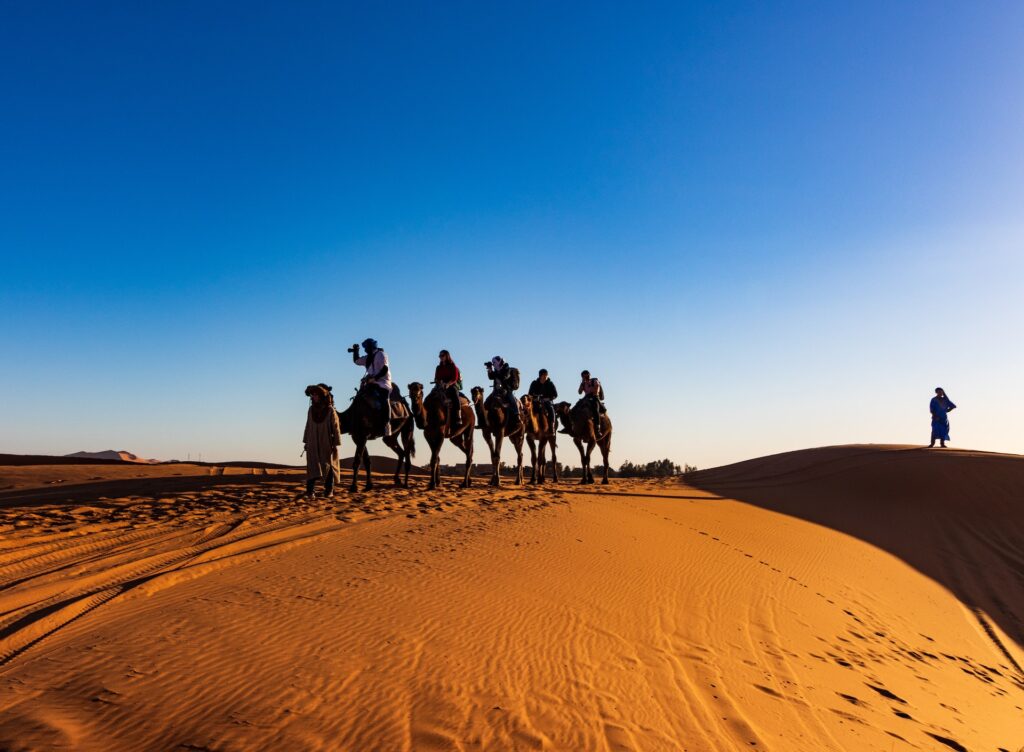
Morocco Travel Recommendations
Overall, Morocco is like any other travel destination, with its own cultural and historic particularities and recommendations are another important part of this travel guide. You should keep several details in mind, like how to contact the police or emergency services. Additionally, it’s advisable to purchase travel insurance with comprehensive coverage and medical services included. See our suggestions below for your journey to this beautiful destination.
How Safe is Morocco?
Morocco is generally safe for tourists, but like any other destination, it’s important to exercise caution and be aware of your surroundings. Petty crimes, such as pickpocketing, can occur in crowded areas, so it’s wise to stay vigilant. Additionally, it’s advisable to dress modestly and respect local customs.
Entry Requirements
To enter Morocco, you will typically need a valid passport with at least six months of validity remaining. The specific entry requirements may vary depending on your nationality. It’s essential to check with the Moroccan embassy or consulate in your country for up-to-date visa and entry information.
As a small but important detail in this guide, when you travel to Morocco, check for any layovers and confirm that you have a visa or permit for the layover destination.
Stay Connected
Even while abroad, it’s important to get an internet connection. This is not just to share your experiences with your friends and family back home but to stay safe. Share your travel details with family and those closest to you so they know where you are at all times. Additionally, with a data plan, you can easily get routes to nearby restaurants, beaches, and historic sites. There are several options to get a data connection on your smartphone, including a local SIM, a Pocket WiFi, and even roaming services, but we mostly recommend the new eSIM.
With a compatible phone and a popular provider like Holafly, you won’t miss a thing in Morocco. With online providers like the one previously mentioned, you can get the best eSIM for Morocco as easily as one, two, or three.
All you need to do is go to the official website, select your destination, and complete the payment. You’ll receive an activation or QR code to install the eSIM, and you’re good to go!
As you’ll notice, there are many places to visit in Morocco and plenty of things to do while visiting. You just have to keep some important details in mind.
You want to know when’s the best time to visit, the top tourist locations, and much more. Your internet connection is a crucial factor, and it’s best to get your eSIM before you leave home. You won’t worry about ending up without an internet connection, and you’ll have a journey of a lifetime! Don’t miss out; get your digital chip now.
Frequently Asked Questions
For visits of up to 90 days, most visitors from North America, Europe, and elsewhere can enter Morocco visa-free. However, the need for a visa can change based on your country of origin and the purpose of your trip. If you want accurate information, you should check the website of the Moroccan embassy or get in touch with them directly.
The months of March through May and September through November offer the greatest weather and the most beautiful scenery in Morocco. The Atlas Mountains bring cooler temperatures in the evenings, even during the milder winter months.
You can get your eSIM for Morocco from a number of eSIM suppliers who offer their services online, for example, Holafly. Verify that your phone is eSIM-compatible and that it is unlocked.
Tap water in Morocco is often not safe to drink. Water quality from the tap varies widely across the country and may not be drinkable depending on where you live. Bottled water or filtered water is your safest bet while visiting Morocco.




 No results found
No results found



